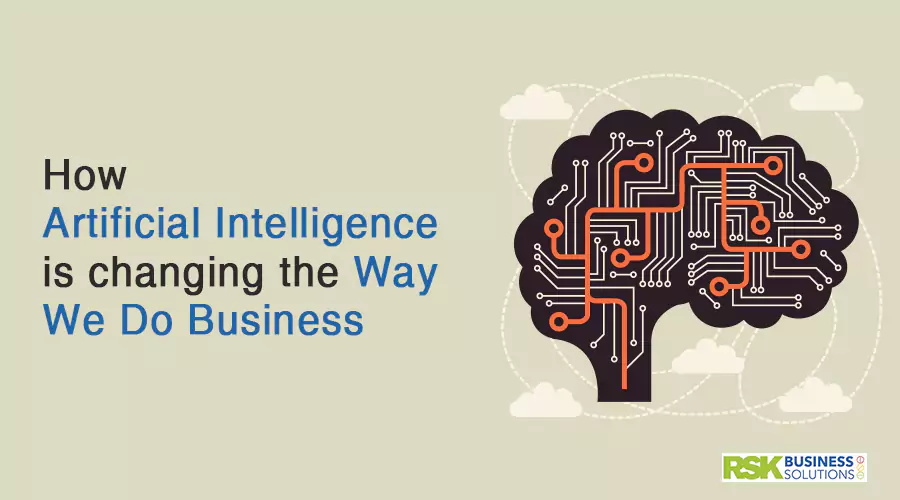
Artificial Intelligence has been one of the most innovative new developments in business, in recent times. Although the field is, still, largely uncharted and unexplored, AI in business operations is expected to rise exponentially, once the technology becomes widespread and mass produced.
Related Articles

IT Outsourcing
RSK BSL Tech Team
May 4, 2025
|
|

Mobile Application Development
RSK BSL Tech Team
April 30, 2025
|
|

Software Development
RSK BSL Tech Team
April 27, 2025
|
|

Hire resources
RSK BSL Tech Team
April 24, 2025
|
|

Software Development
Praveen Joshi
April 20, 2025
|
|

Artificial Intelligence
Praveen Joshi
April 17, 2025
|
|

Pen Testing
Praveen Joshi
April 15, 2025
|
|

AI Tech Solutions
RSK BSL Tech Team
April 14, 2025
|
|

Software Development
RSK BSL Tech Team
April 9, 2025
|
|

Pen Testing
RSK BSL Tech Team
April 7, 2025
|
|

Software Development
RSK BSL Tech Team
April 3, 2025
|
|

Cloud Application
RSK BSL Tech Team
March 31, 2025
|
|

Pen Testing
Praveen Joshi
March 27, 2025
|
|

Software Development
RSK BSL Tech Team
March 25, 2025
|
|

Software Development
RSK BSL Tech Team
March 20, 2025
|
|

Software Development
RSK BSL Tech Team
March 18, 2025
|
How Artificial Intelligence is changing the Way We Do Business
Artificial Intelligence has been one of the most innovative new developments in business, in recent times. Although the field is, still, largely uncharted and unexplored, AI in business operations is expected to rise exponentially, once the technology becomes widespread and mass produced.
AI, by every standard, is an ambitious move for any organisation, but one that will take a company to whole another level, once integrated. There is still a significant gap in ambition and execution of AI initiatives, due to the fact that it’s still, by and large, experimental and rather expensive.
BPO (Business Processing Outsourcing) companies are expected to automate their business operations, in off-location sites, like India, with AI. That could either be a controversial move or a constructive one.
On one hand, automation like that could make human effort obsolete, and lead to layoffs, on another hand, it could lead to creation of more jobs, because a new technology like AI will need human intervention to run interfaces smoothly.
For now, only large business organisations and conglomerates, are predicted to have an AI strategy in place, and not many do. Businesses treat AI cautiously, because they don’t want to act in haste, in their financial investment in an, arguably, new technology, in an off chance it might turn out to be a fad. Then they would have wasted an incredible amount of money.
There are also many managerial challenges associated with AI integration in business processes. For instance;
- Large scale transformation to AI automation,
- Hesitation among senior management staff about long-term investment in AI,
- Difficulty in adapting or willingness to adapt to extensive alteration, etc.
The most likely companies to invest in AI automation, will be the ones that deal with customer services. Customer Relationship Management (CRM), and everything related to it, will benefit greatly from AI. Customer-centric activities like, Marketing, Supply Chain Management (SCM), support and maintenance, are expected to reach their full potential with Artificial Intelligence.
One of the biggest hurdles in large-scale business application of AI, is acquiring the knowledge and expertise to run such a system. The talent pool, for AI application, is quite slim for now. Training will have to be imparted to a handful of AI enthusiasts, with the necessary skill and aptitude.
There is also the looming worry of overwhelming presence of machines at the workplace. The workforce will need to be trained to adapt to function with the presence of heavy automation. Changes in behaviour and communication are expected to happen, in the daily work environment.
In a way, humans and AI will have to work together and build off each other’s strengths to create a competitive advantage, for a business. Any business strategy, involving AI, will involve cooperation and harmony between human effort and automation.
It can be predicted that Artificial Intelligence will revolutionise the work space. It is, universally, agreed upon, that AI will require employees to augment and update their specific skill-set. Assertions can be made, with great confidence, that in the future, employees, who are adept with AI, will replace the ones that aren’t.
Praveen Joshi
Praveen is a seasoned IT Solutions Leader and Director at RSK Business Solutions, a technology-driven IT Consulting Company that specializes in Bespoke Software Development, Agile Consulting, Mobile App Development, Smart Sourcing, and much more. For the last 17 years, he has been delivering quality custom IT solutions that help businesses achieve their goals.

 Share
Share Post
Post Tweet
Tweet Copy
Copy


